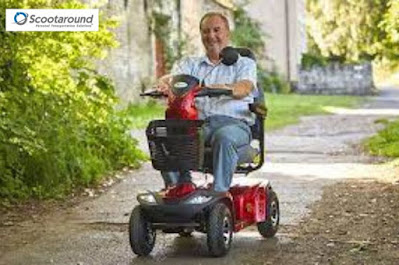Driving Change: The Role of Mobility Scooters in Shaping the Future of Personal Mobility
Introduction
In an increasingly fast-paced world, personal mobility is of utmost importance for individuals of all ages, especially those with mobility challenges. While traditional walking aids have been around for centuries, modern technology has paved the way for more innovative and efficient solutions.
Among these, mobility scooters have emerged as a transformative force, empowering individuals with limited mobility to regain their independence and actively participate in society. In this blog, we will explore the vital role mobility scooters play in shaping the future of personal mobility, the benefits they offer, and their impact on individuals and communities worldwide.
The Rise of Mobility Scooters
Mobility scooters are electric-powered mobility devices designed to assist individuals with limited mobility due to age, disability, or injury. The concept of mobility scooters can be traced back to the 1960s, but it was not until the 1980s that they gained significant popularity. Technological advancements and a growing demand for enhanced mobility options have since led to the widespread adoption of mobility scooters in various parts of the world.
The Benefits of Mobility Scooters
1. Independence and Freedom
One of the most significant benefits of mobility scooters is the sense of independence they provide to users. People who once relied on others for assistance in moving from one place to another can now maneuver their scooters with ease, making errands, shopping, and socializing much more accessible.
2. Improved Quality of Life
With the freedom to move around independently, individuals using mobility scooters experience an improved quality of life. They can actively engage in activities they enjoy, fostering a sense of fulfillment and happiness.
3. Environmental Impact
Mobility scooters are electrically powered, making them an environmentally friendly mode of personal transportation. By reducing reliance on gas-powered vehicles, mobility scooters contribute to reducing carbon emissions and promoting sustainable living.
4. Inclusive Design
Mobility scooters are designed with accessibility and inclusivity in mind. They come in various sizes and configurations, including the likes of a folding mobility scooter catering to different needs and preferences. Additionally, their ease of use allows people of all ages and abilities to operate them comfortably.
5. Cost-Effective Mobility Solution
Owning and operating a mobility scooter is often more cost-effective than other forms of personal mobility. They require minimal maintenance and do not incur the expenses associated with owning a car or hiring personal transportation services regularly. A good example of this is the affordable range of Pride Mobility scooters for sale.
Shaping the Future of Personal Mobility
1. Advancements in Technology
The future of personal mobility heavily relies on technological advancements. As technology continues to progress, mobility scooters are likely to see further improvements in battery efficiency, range, and overall performance. Additionally, developments in connectivity may lead to smarter mobility scooters equipped with advanced navigation systems and safety features.
2. Integration with Smart Cities
The ongoing trend of building smart cities that prioritize sustainability and accessibility aligns perfectly with the use of mobility scooters. These compact and eco-friendly devices can seamlessly navigate smart city infrastructures, fostering inclusivity and making urban living more accessible for everyone.
3. Customization and Personalization
Personalization will play a significant role in the future of mobility scooters. Manufacturers may offer a wide range of customization options, allowing users to tailor their scooters to their specific needs, preferences, and styles.
4. Increased Awareness and Acceptance
As mobility scooters become more prevalent, there will likely be increased awareness and acceptance of these devices in public spaces. This will lead to better infrastructure planning and design that accommodates the unique needs of mobility scooter users, such as accessible pathways and designated charging stations.
5. Collaborative Solutions
The future of personal mobility will be characterized by collaborative efforts between governments, manufacturers, and advocacy groups. By working together, these stakeholders can address various challenges related to mobility and create more supportive and inclusive environments for mobility scooter users.
Challenges and Considerations
While mobility scooters hold great promise for the future of personal mobility, several challenges need to be addressed:
1. Safety Concerns
As the number of mobility scooters on the roads and pedestrian areas increases, ensuring safety becomes paramount. Proper training for users and implementing safety regulations will be crucial in minimizing accidents and ensuring the well-being of both scooter users and pedestrians.
2. Infrastructure Accessibility
While smart cities may embrace the concept of mobility scooters, older urban areas and communities may face challenges in providing adequate infrastructure and accessibility for these devices. Efforts to retrofit existing infrastructure should be part of the future mobility strategy.
3. Awareness and Education
Promoting awareness and educating the public about mobility scooters is essential to foster understanding and acceptance. Addressing misconceptions and stereotypes surrounding these devices can create a more inclusive and supportive environment.
Conclusion
Mobility scooters are not just personal mobility devices; they represent a symbol of independence, empowerment, and inclusivity. As we move towards a future that values sustainability and accessibility, mobility scooters are playing a pivotal role in shaping the way individuals with limited mobility interact with the world around them. Through advancements in technology, increased customization options, and collaborative efforts, mobility scooters are driving change, paving the way for a future of personal mobility that is accessible, safe, and transformative for all. By embracing this evolution in personal transportation, we can build a society that values the freedom and dignity of every individual, regardless of their mobility capabilities.

.jpg)


Comments
Post a Comment